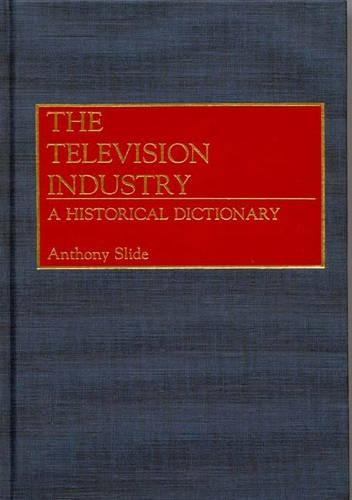
The Television Industry: A Historical Dictionary
(Hardback)
Publishing Details
The Television Industry: A Historical Dictionary
By (Author) Anthony Slide
Bloomsbury Publishing PLC
Greenwood Press
13th August 1991
United States
Classifications
Tertiary Education
Non Fiction
Reference works
384.5540973
Physical Properties
Hardback
392
Description
This dictionary is the first "what's what" of television. Its more than 1000 entries provide succinct factual data on production companies, distributors, organizations, genres, historical and technical terms, and much more. All areas of the industry, including "free", public, and cable television, are covered. While the majority of the entries relate to the American television industry, the book is international in scope. Following many of the entries is an address, if the company or organization is still active, and, where appropriate, a bibliography. An asterisk following a name indicates that there is a separate entry for that subject. Headings are based on the best-known name of the company or technical innovation and are not necessarily the final names by which the subjects are known. However, all such alternative names are included in the index. Wherever feasible, birth and death years are noted for key figures. A general bibliography of reference books on television appears at the end of the volume. The index provides immediate access to all the entries and to the personalities discussed in each entry. In addition, there is a programme index, providing the reader with speedy information as to which company or distributor is responsible for which series.
Reviews
. . . an essential reference tool for any scholar, student, or librarian in the study of the television industry.-Popular Culture in Libraries
. . . will serve as an essential reference tool for any scholar, student, or librarian in the study of the television industry.-Popular Culture in Libraries
As the title implies, the business of television rather than its programming is the focus of this historical dictionary. Its entries briefly relate the histories of production companies, networks, cable stations, industry associations, and public interest pressure groups. The focus is on the American television industry from its origins through early 1991, but it also selectively covers the industry worldwide. A few anomalous entries crop up, anomalous not so much because of their nature as because of their rarity. . . . Slide has produced another hit, another basic source on one of America's basic industries.-Wilson Library Bulletin
With this volume the prolific Slide completes his unofficial trilogy of "what's what" historical dictionaries, following The American Film Industry and The International Film Industry. More than 1,000 entries briefly and concisely describe "production companies, distributors, organizations, genres, technical terms, and much, much more," the latter including such diverse topics as "T 'N' A" and "Couch Potatoes" (among the missing: "Sound Bites" and "Lexiconing"). Entries for still-active companies or organizations include addresses: bibliographies are frequent. Emphasis is on the US but other countries receive varying degrees of treatment. The appendix "provides brief biographical essays on the three major network figures in American television history: Leonard H. Goldenson, William S. Paley, and David Sarnoff." The name and program indexes are essential: the Emmy Award for instance, has neither separate entry nor cross-reference, but the index leads to its treatment under "The Academy of Television Arts and Sciences." Much of this information can be found in more specialized sources, but Slide has compiled a commendable ready reference.-Choice
." . . an essential reference tool for any scholar, student, or librarian in the study of the television industry."-Popular Culture in Libraries
." . . will serve as an essential reference tool for any scholar, student, or librarian in the study of the television industry."-Popular Culture in Libraries
"As the title implies, the business of television rather than its programming is the focus of this historical dictionary. Its entries briefly relate the histories of production companies, networks, cable stations, industry associations, and public interest pressure groups. The focus is on the American television industry from its origins through early 1991, but it also selectively covers the industry worldwide. A few anomalous entries crop up, anomalous not so much because of their nature as because of their rarity. . . . Slide has produced another hit, another basic source on one of America's basic industries."-Wilson Library Bulletin
"With this volume the prolific Slide completes his unofficial trilogy of "what's what" historical dictionaries, following The American Film Industry and The International Film Industry. More than 1,000 entries briefly and concisely describe "production companies, distributors, organizations, genres, technical terms, and much, much more," the latter including such diverse topics as "T 'N' A" and "Couch Potatoes" (among the missing: "Sound Bites" and "Lexiconing"). Entries for still-active companies or organizations include addresses: bibliographies are frequent. Emphasis is on the US but other countries receive varying degrees of treatment. The appendix "provides brief biographical essays on the three major network figures in American television history: Leonard H. Goldenson, William S. Paley, and David Sarnoff." The name and program indexes are essential: the Emmy Award for instance, has neither separate entry nor cross-reference, but the index leads to its treatment under "The Academy of Television Arts and Sciences." Much of this information can be found in more specialized sources, but Slide has compiled a commendable ready reference."-Choice
Author Bio
ANTHONY SLIDE has held executive positions with both the Academy of Motion Picture Arts and Sciences and the American Film Institute. He is the author or editor of more than forty books on the history of popular entertainment, including The American Film Industry (Greenwood Press, 1986) and The International Film Industry (Greenwood, 1989). Aside from his activities as a writer, Slide is also the editor of the Filmmakers series, and has produced and directed documentaries on Blanche Sweet, Viola Dana, Karl Brown, and early women directors.
